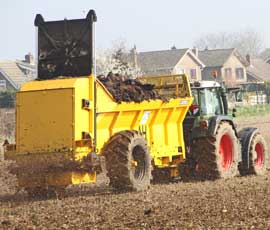Muckspreader hire firm builds range of spreaders

The muckspreader hire business is definitely alive and well, says Tim Hubert, who heads up Agri-Hire at Bramford, Ipswich. The company’s spreader fleet now has 40 machines and numbers are rising by 10% a year.
“Our customer base is located mainly in the east of the country but extends nationally,” he says. “And we tend to have spreaders out for most of the year with only a slight slowing down in demand during the harvest period.”
“We hire out machines for all manner of purposes,” he says. “It’s not just for muck from cattle, pigs and chickens. Increasingly they are being used to spread compost produced by green waste companies.”
There is also a growing trend for contractors who have no spreaders of their own to simply hire machines when they have a need to use them, he says.
“They have no investment or depreciation costs and they know just how much the machines will cost them for a given job – and how much to charge their customers as a result.”
At the other end of the spectrum are farmers who just want a spreader for a few days a year to apply muck to stubbles in the autumn.
“Most people now appreciate the value of muck and use it as a direct replacement for purchased fertiliser, but this means spreaders have had to become more sophisticated – usually with weigh cells and the ability to record just how much muck has been applied to a given area,” he says.
Agri-Hire started business in 1986 hiring out ploughs and power harrows and added muck spreaders to its portfolio a couple of years later. But getting a reliable machine wasn’t always easy.
“I just couldn’t find many spreaders which could cope successfully with the rigours imposed on them through being used all the year round,” he says. “The only solution was to build our own to a specification which could withstand the workload.”
So, 10 years after starting the business, he has now designed a range of spreaders which he says are built with liberal use of metal beams and plating along with oversize bearings, shafts and chains.
“It was in our own interest that these machines should last without causing us any repair or downtime,” he says. “The very first spreader we built is still working after 20 years.”
There are currently models from 10t to 40t capacity with either single, double or triple axles and vertical or horizontal beaters with twin disc spreaders. There are options for slurry doors, greedy boards, air brakes and a host of other bespoke options.
The hire fleet, which includes various sizes of spreaders, is added to each year with new models as the older ones complete their three years of service before being refurbished and sold on with a 12-month warranty.
Before they are delivered to farms by one of the company’s two Unimogs, the spreaders are given a maintenance check, greased up and pressure washed
“We are always conscious of reducing the risk of passing on diseases from farm to farm and insist that not only are the spreaders cleaned by the customer prior to the machine leaving the farm but also thoroughly re-cleaned before we allow them to be used by another customer,” says Mr Hubert.
Hire costs range from £130-200 a day depending on model size and length of hire. During the busy season when spreaders are in big demand there is a charge made for every day the spreader is on farm – whether it is used or not.
However, Mr Hubert says there may be some concessions in some circumstances.
“There has to be a degree of trust in the job,” he says. “I know that there are those who try and keep a spreader working almost around the clock to make the most of the hire charge, as there are those who for some reason or another can’t use them for a few days.”

